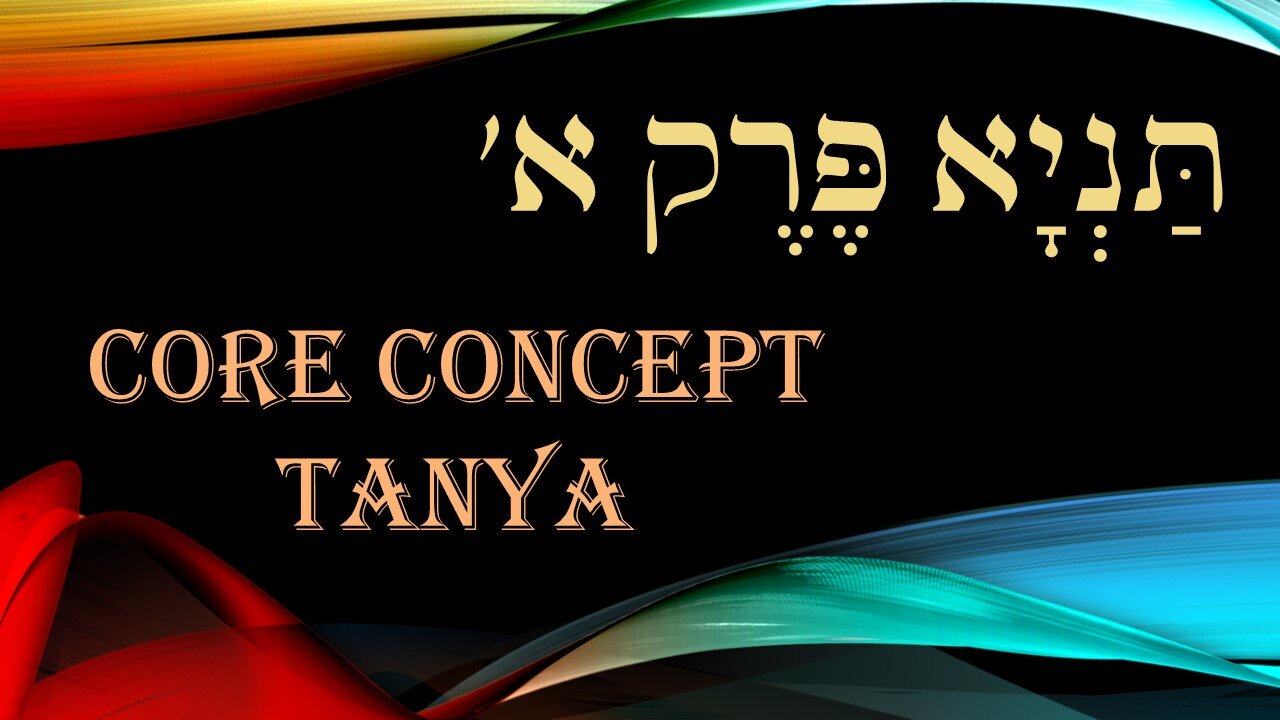Premium Only Content

Core Concepts Tanya: Intro & Chapter 1
Brief Recap of Intro & Chapter 1:
1. Tanya is based on the verse “This thing is very near to you,” as in service of G-d, fulfilling Torah and Mitzvot, building a relationship of love and fear of G-d, is something attainable by all not just scholars and “holy” people. We might not feel this way, as doing what Hashem wants doesn’t always take precedence in our lives, nor does it always bother us if it doesn’t. Moreover, these things don’t feel near and accessibly but difficult and beyond our reach.
However, says the Alter Rebbe, you don’t quite know what you’re made of…
2. Tanya is the basis of Chabad Chassidus, which focuses on using our intellect to control our emotions to enhance our service of G-d. In other words, whatever our nature or natural proclivities, whatever our inherent sensitivity toward G-dliness, we are in control of our selves and we can steer our selves in the right direction if we so choose. It doesn’t meant that it’ll be easy—Tanya takes us on the long short way after all—but it does mean that we can embark on this journey, and that the journey itself matters.
3. There are five basic categories of people; two levels of righteous, two levels of wicked, and the “Intermediary.” The “Intermediary” is the person we work to be, which seems simple enough, but more on that to come...
4. There are three levels in the world; Kedusha, which is anything holy/reveals G-dliness in the world; “Klipah” which is the gray zone, things are permitted and either elevated to holiness or not depending on how we use them; Sitra Achra, “the other side,” which is anything that blocks G-dliness from shining in this world. This not only includes evil, but also anything Hashem says is forbidden and not for us.
5. There are four basic elements that all character traits come from; fire, water, air, earth. Fire represents passion, water represents pleasure, air represents things without substance, and earth represents things which weigh us down. These traits can be good or not good depending on how we use them, which is important to note because it means we can hone in on them and try to redirect them for good things.
An example is pride. If it makes us arrogant, then that's no bueno. If it keeps us from doing wrong things, because we’re better than that, then it's being used for good.
6. Every single person has a soul. It's what gives life to our body, it's how we function.
The “Animal Soul” or “Natural Soul” is grounded in this world, the “G-dly” Soul only wants G-d.
Both souls are holy and come from G-d, the difference is in their focus. The Animal Soul isn’t a soul that’s always in “beast mode,” rather it’s a soul that’s instinct driven, that focused on preserving life in the here and now. Think of an animal that eats when it’s hungry, that growls at danger, that protects its young. None of these things are inherently evil or inappropriate, as we need them to survive. Like an animal, the Animal Soul is also capable of great levels of kindness. Think of a service dog, and the like.
The Animal Soul will do good things because it feels good, because it knows it’s right on an intellectual level, or whatever other logical reason.
The G-dly differs in that it only focuses on G-d and does good not because it makes sense, but because that’s what G-d wants.
Every person has an Animal Soul; Jews are given the extra G-dly Soul, because we need it to help fulfill our Divine mission.
Think of the army. All soldiers are given certain equipment. Navy SEALS are equipped differently because they’re an elite unit working on specialized missions. The Jewish people are charged with fulfilling Torah and Mitzvot in this world, and the G-dly Soul is our anchor and guide to fulfilling our specific spiritual mission.
-
 1:11:25
1:11:25
vivafrei
2 hours agoKash Patel's Jacket-Gate! Pfizer Whistleblower Qui Tam on Appeal! Meanwhile in Canada! AND MORE!
25.9K13 -
 1:05:46
1:05:46
The Quartering
3 hours agoNew Epstein Video Drops! The US Economy Has SCARY Numbers Released & More
102K19 -
 1:07:11
1:07:11
The White House
5 hours agoPresident Trump Makes an Announcement, Dec. 3, 2025
14.5K12 -
 16:30
16:30
Clintonjaws
5 hours ago $0.49 earnedEntire Room Speechless as Pete Hegseth Snaps Destroying All Media To Their Face
2.21K2 -
 LIVE
LIVE
Film Threat
21 hours agoINSIDE THE DECLINE OF DISNEY! A WARNING FROM THE PAST | Hollywood on the Rocks
291 watching -
 1:15:43
1:15:43
DeVory Darkins
4 hours agoDISTURBING: Gavin Newsom makes FATAL MISTAKE after Criminal Illegal Alien kills 11 year old boy
118K58 -

MattMorseTV
3 hours ago $9.88 earned🔴Trump's HUGE ANNOUNCEMENT.🔴
34.6K28 -
 LIVE
LIVE
Dr Disrespect
6 hours ago🔴LIVE - DR DISRESPECT'S TRIPLE THREAT CHALLENGE - ARC RAIDERS • BF6 • FORTNITE
1,303 watching -
 1:18:21
1:18:21
Sean Unpaved
4 hours agoArch Manning & Texas ELIMINATED From College Football Playoff Contention | UNPAVED
40.9K3 -
 1:59:06
1:59:06
The Charlie Kirk Show
4 hours agoBlackpilled Zoomers + Charlie's Sabbath + Minnesota Meltdown | Bowyer, Turek, Glahn | 12.3.2025
75.3K29